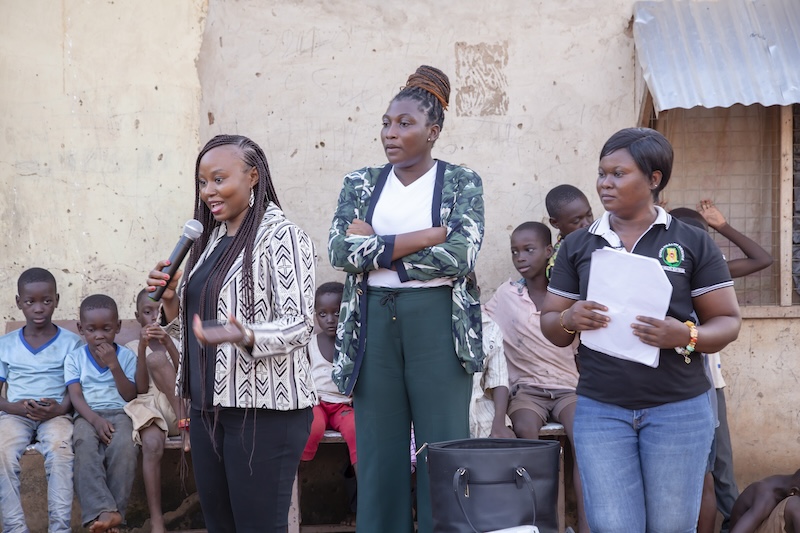"No woman should have to sacrifice her life to give life,” says Yenupini Joyce Adams, who, with funding in part from the Ford Program in Human Development Studies and Solidarity, has developed an innovative care model – Focused Postpartum Care (Focused-PPC) – that improves outcomes for mothers during the vulnerable postpartum period.
“Access to quality maternal healthcare should be a right for everybody regardless of where you live and regardless of where you find yourself,” says the associate professor of the practice for both the Keough School of Global Affairs and the Eck Institute for Global Health. But unfortunately, care for mothers has been found lacking, especially in Sub-Saharan Africa and other low and lower-middle income countries.
In particular, according to the World Health Organization, countries in Sub-Saharan Africa account for 70% of the global maternal mortality rate, with the highest number of deaths occurring in the year after birth – also known as the postpartum period. The Focused-PPC project in Ghana, Adams’ two-year randomized controlled trial that was conducted across four healthcare facilities in Tamale, addresses this issue and provides a model for improving women’s postpartum outcomes around the world.
Focused-PPC provided integrated postpartum care, education, and support to women after the birth of their children for up to 12 months after delivery. Women enrolled in Focused-PPC experienced less stress and fewer positive screenings for depression over time, knew more warning signs of postpartum complications, demonstrated better knowledge on diet and nutrition, and were more likely to eat healthy meals than those receiving usual care. In addition to the Ford Program, the study was funded by the Eck Institute and the Indiana Clinical and Translational Sciences Institute.
"This project embodies the mission of the Ford Program: conducting research that not only supports but actively centers human dignity,” says Patrizio Piraino, director of the Ford Program and professor of education, labor, and development in the Keough School. “We are committed to accountable partnerships with local communities, aligning with their self-defined goals to advance the dignity and well-being of society’s most vulnerable members."
Adams partnered with the Ghana Health Service and Savana Signatures, a local organization focused on health outcomes, inclusive quality education, economic empowerment, and climate change adaptation. In collaboration, they conducted focus groups, examined existing postpartum care practices, and identified gaps in care to develop the program and its educational materials.
“We talked to women at these health facilities about their experience with postpartum care and their knowledge of potential complications, mental health, and more to inform the program development,” says Adams. “We found that postpartum care was basically just baby care. Baby gets weighed, baby receives immunizations – even the education was focused around newborn care, breastfeeding, and baby safety. Moms weren’t receiving clinical assessments as they should, and we found some postpartum practices among women that were unhelpful and likely perpetuated through lack of education.”
Compared with the control group receiving typical care that ended at six weeks, the mothers in the experimental group received more frequent contact with healthcare providers for an extended period of time – one to two weeks after delivery, six weeks after delivery, and once per month until a year after delivery. More frequent head-to-toe clinical assessments improved maternal health outcomes and women were more satisfied with the care they received. The women also received standardized postpartum education through trained midwives in a group setting that provided meaningful peer support from other mothers.
 In addition to being shared at conferences and submitted for publication in academic journals, as is the practice with Ford Program research, the results of the Focused-PPC study and recommendations were shared with community partners: with the Ghana Health Service and Savana Signatures, and with the local community through educational community engagement sessions.
In addition to being shared at conferences and submitted for publication in academic journals, as is the practice with Ford Program research, the results of the Focused-PPC study and recommendations were shared with community partners: with the Ghana Health Service and Savana Signatures, and with the local community through educational community engagement sessions.
“It was also a way for me to give back to the community that I come from,” says Adams, who was born and raised in Tamale, where the study was conducted. And now with funding from Kellogg, she’s piloting the Focused-PPC model for the community she lives in today – northern Indiana – in partnership with Beacon Health System. The pilot program launching in July 2025 will work with mothers at two Beacon Medical Group Obstetric practices in St. Joseph County and two in Elkhart County.
“My hope is that this model of care will be adopted more in Sub-Saharan Africa and here in the US,” says Adams. “The ultimate goal is to reduce maternal mortality and morbidity as outlined in the United Nations Sustainable Development Goal 3, Target 1 . This type of care and follow-up for women is an important intervention that focuses on the well-being of these mothers and their children so that they can thrive.”





